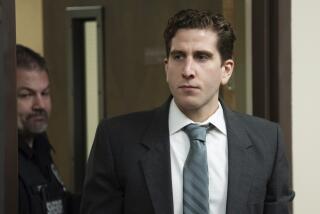Tuffree Case to Stay With Judge Steele
- Share via
Superior Court Judge Allan L. Steele made it clear last week that he did not want any part of the retrial of accused murderer Daniel Allan Tuffree.
But on Tuesday, Judge Charles W. Campbell Jr. made it equally clear that Tuffree’s second trial will stay with Steele, who is the judge most familiar with the high-profile murder case.
The decision by Campbell, presiding criminal court judge, came one week after Steele told attorneys that he would not preside over Tuffree’s retrial and ordered exhibits from the case removed from his courtroom.
Tuffree, 49, is accused of deliberately shooting a Simi Valley police officer to death last year during a gunfight with police at his home.
Although Tuffree was found guilty of attempted murder and armed assault for firing at another police officer, the jury was hung on the remaining charge of first-degree murder.
Tuffree has waived his sentencing on those convictions until the murder charge is resolved.
Steele declared a mistrial in the case after the jury deadlocked Oct. 10. Five days later, Steele sent the case out of his courtroom without explanation and over the objections of prosecutors.
At the time, prosecutors and defense attorneys said it was unusual for Steele to send the case back to the presiding criminal court judge for reassignment--a move that would have forced one of Steele’s colleagues to take over the high-profile trial.
But they said little Tuesday about why the case had returned to Steele.
“That is between Steele and Campbell,” Deputy Public Defender Howard Asher said. “Campbell just makes assignments, I don’t ask why.”
Walking out of court, Deputy Dist. Atty. Pete Kossoris shrugged his shoulders when asked why the case was sent back to Steele.
Kossoris had objected to Steele removing himself from the retrial, arguing that it would take a new judge longer to get up to speed on the case.
“I would stand by the remarks that I made in court, which were to the effect that Judge Steele was familiar with the issues,” Kossoris said Tuesday.
Whatever the reasons, both lawyers said that with Steele presiding over the second trial, the case will move faster than if it had been assigned to another judge.
“I would not expect that the pretrial motions by Judge Steele will be litigated again,” Asher said, which means there will be time saved. “The retrial will go faster for that reason only.”
The attorneys are scheduled to meet in Steele’s courtroom this morning to set a new trial date. His retrial is required to begin within 60 days or by Dec. 22.
Superior Court Judge Melinda A. Johnson said it was not unusual that the case had found its way back to Steele, given the new restructuring of the court calendar.
Under that new system, which started during the Tuffree trial, cases are put on a master calendar and assigned to individual judges, Johnson explained.
“It is not a big surprise,” she said.
Campbell’s decision was not a repudiation of Steele, she said, adding that there has not been discord among the judges over the situation.
“I don’t think so at all,” she said. “I don’t remember hearing any conversation, I think it was just going through the normal procedure. . . . We all work a little parallel, but I didn’t pick up any of that.”
Public Defender Kenneth I. Clayman said the decision was logical given the number of potential capital cases looming for trial.
In addition to Tuffree, Diana J. Haun, Alan Brett Holland and Michael Raymond Johnson are facing murder charges that make them eligible for the death penalty.
“I think you have got a situation where you have many cases kicking around and courtrooms have to be found,” Clayman said. “I don’t know exactly why it went back to Judge Steele but I don’t see anything particularly unusual about it.
“If it is unusual,” he said, “it is because we have an unusual number of cases.”
More to Read
Sign up for Essential California
The most important California stories and recommendations in your inbox every morning.
You may occasionally receive promotional content from the Los Angeles Times.










